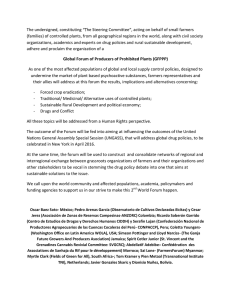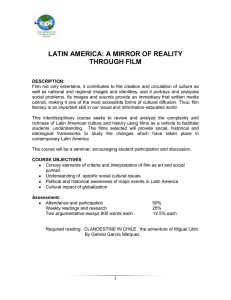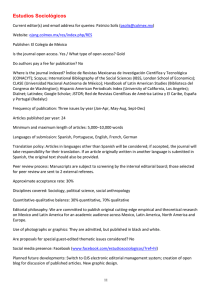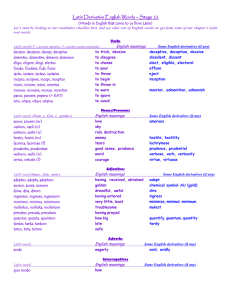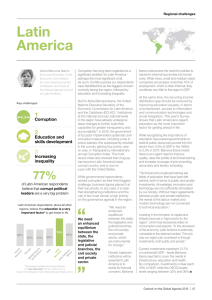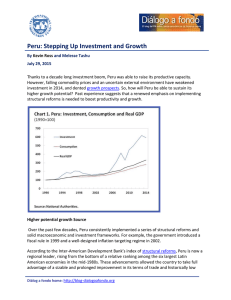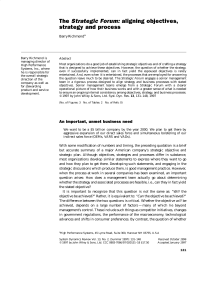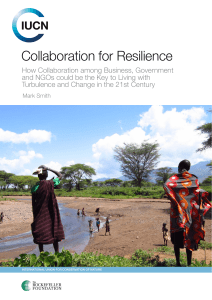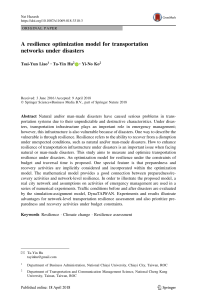Meeting Overview - weforum.org
Anuncio
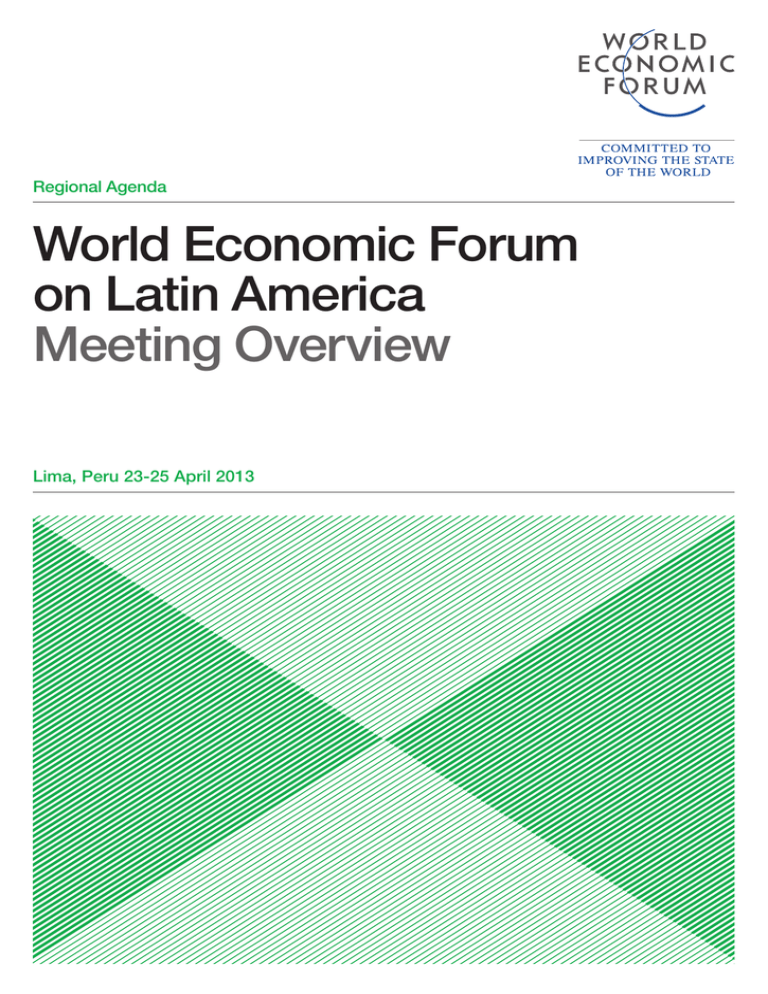
Regional Agenda World Economic Forum on Latin America Meeting Overview Lima, Peru 23-25 April 2013 Delivering Growth, Strengthening Societies In these times of increased global complexity and economic uncertainty, Latin America has maintained steady levels of economic growth and financial resilience while attracting greater foreign investment and impressive tourism activity and progressing significantly towards poverty alleviation. Peru, a country of more than 30 million inhabitants and with a vast territory of 1.3 million km2, is one of the fastest growing economies in the world and offers an array of diverse opportunities. As emerging economies gain relevance in shaping global affairs, the region is fertile ground for innovative business and social development models involving public and private actors, due largely to its wealth of natural resources, cultural heritage and human capital, with more than 150 million young Latin Americans between 15 and 29 years of age. In 2013, Latin America will need to continue to grow for the benefit of society at large while ensuring the modernization of its economies and the strengthening of its democratic institutions. With the full support of President Ollanta Moises Humala Tasso, the Government of Peru and the Forum’s Strategic and Regional Partners, the World Economic Forum gathering in Lima will provide an ideal platform to discuss the critical factors behind the region’s resilience and dynamic development models. Under the theme “Delivering Growth, Strengthening Societies”, regional and global leaders will discuss the opportunities and challenges that lie ahead to achieve the region’s full potential. Securing economic growth requires an investment in all people in our region, and will only come through shared accountability and effective collaboration between government, civil society and the private sector. Carlos Rodríguez-Pastor Chairman, Intercorp, Peru Co-Chairs Programme Objectives Baroness Valerie Amos UndersecretaryGeneral for Humanitarian Affairs and Emergency Relief Coordinator United Nations New York The meeting agenda will integrate the following key issues: Michel M. Liès Group Chief Executive Officer Swiss Re Switzerland Gérard Mestrallet Chairman and Chief Executive Officer GDF SUEZ France Carlos RodríguezPastor Chairman Intercorp Peru Arne Sorenson President and Chief Executive Officer Marriott International USA Modernizing Economies for Dynamic Growth With a forecast of 4% GDP growth in 2013, Latin America has an unprecedented opportunity to consolidate the modernization of its economies while ensuring that economic prosperity brings resilient, dynamic and quality long-term growth. Furthermore, the region needs to implement structural reforms so that its institutional framework can leverage the benefits of its current global position. What new models of public-private cooperation will prove effective in delivering enhanced productivity and sustainable economic growth? How will the financing landscape change in the coming years? What models of regional integration and interregional cooperation will contribute to better leveraging existing resources? How should Latin America shape its innovation and internationalization agendas to transit from commodity exportsustained economies to more sophisticated ones? How can the region enhance its economic resilience while gaining additional relevance in the global context? Strengthening Society through Innovation Sustainable and resilient economic growth and long-term development will depend on the level of equality and social inclusion that they are able to deliver. Sharing success stories, lessons learned and best practices in the field of social innovation and social entrepreneurship are timely, as the region faces an unprecedented opportunity to scale social innovation for greater impact through the implementation of suitable policy frameworks. Sluggish education systems and innovation ecosystems need to be revamped to ensure that the region continues to build on its achievements. What policies will result in poverty alleviation and a reduction of social inequality? How can the private sector be a key partner in the region’s social landscape transformation? How can science and technology deliver social benefit? How can the region adjust and design future social policies to ensure a sustainable demographic shift? How is the young generation shaping the future of Latin America? How can a multistakeholder approach contribute to addressing priority challenges in areas related to public security? Building Resilience for Sustainable Development Quality growth and the establishment of inclusive societies will necessitate sensible management of natural resources as well as sustainable development of traditional sectors. At the same time, cities are emerging as the new poles of economic development, which pose both challenges and opportunities for the long-term resilience of their inhabitants. The needs of an emerging middle class will require creative solutions to ensure the efficient use of available resources. While Latin America currently enjoys a positive demographic bonus, the decrease in population growth rates is alarming. How can the region better prepare for unforeseen demographic shifts? How can it be ensured that a growing middle class enjoys a better quality of life without endangering it for future generations? How will Latin American cities manage urbanization? How should the different stakeholders work on the sustainable management of the region’s wealth of natural resources and biodiversity? Meeting Information FAQs We have further improved the interactive, outcome-oriented format of Forum discussions. Speeches are discouraged and all participants are invited to contribute actively to constructive, lively debate. Where will the meeting take place? The meeting will take place at the Westin Lima Hotel and Convention Center in Lima, Peru. Arena Sessions offer interactive debate with top government, business and civil society leaders. Prepared remarks by the panel are kept to a minimum in favour of intensive discussions under the guidance of a moderator. Interactive Lunch Sessions generate meaningful debate on an issue of global importance in a semi-formal, interactive and off-the-record setting. There are no speeches; short introductory remarks set the context and integrate various points of view, followed by discussions in which all participants are invited to take part. Interactive Sessions provide in-depth understanding of new, emerging or complex issues in various domains. The aim is to expand the dialogue on the panel to include all participants. There are no prepared remarks and most of these sessions are conducted in a question-and-answer (Q&A) format. Where will I stay? As all official hotels for the World Economic Forum on Latin America are now fully booked, participants are asked to make their own hotel arrangements. Upon registration, you will receive a list of recommended hotels. What does the registration fee include? The registration fee (US$ 3,500 for Forum Members, US$ 4,500 for non-Members) includes access to all sessions, including plenaries, interactive sessions, workshops, lunches and dinners. What is the working language of the meeting? All sessions will be held in English. Simultaneous interpretation into Spanish will be provided in most sessions. An Insight, An Idea Sessions introduce an inspiring individual from business, government, academia or civil society to share his/her insights and prediction of an idea on an important transformation in the region in the coming years. By when should I register? The registration deadline for inclusion in the printed Participants booklet is Wednesday 3 April 2013. Plenary Sessions provide strategic insights and raise awareness of important trends and themes. These sessions provide the conceptual framework for further discussions. Therefore, there are no prepared remarks, with most of the session conducted as a lively discussion among the panellists in a Q&A format. The sessions are open to the reporting press and are webcast live. The Closing Plenary highlights the outcomes of the meeting and maps out the future engagement of the main stakeholders. Do I need a visa? Please check with the Peruvian embassy or consulate nearest you for visa requirements. You may also consult the following website, which lists the countries that require a visa to enter Peru: www.rree.gob.pe/servicioalciudadano/Documents/ VisasXExtranEnero2012.pdf Televised Sessions are co-designed with global media, feature headline topics and raise awareness of important trends by broadcasting the discussion to a global audience. WorkStudio sessions promote greater interaction between discussion leaders and participants on a compelling challenge or complex issue. They are facilitated group discussions that focus on input from discussion leaders, capture direct feedback from participants and build consensus on priorities and solutions. This logo denotes GGC track sessions in the programme. Global Growth Company (GGC) tracks comprise a selection of sessions of particular relevance to companies experiencing strong growth and engaging in international expansion. GGC track sessions are an integral part of all Forum regional meeting programmes. Where appropriate, the output of each will be incorporated into subsequent GGC track sessions in the build-up to the Annual Meeting of the New Champions 2013, which will take place in Dalian, People’s Republic of China, from 11 to 13 September. For sessions that are not open to the reporting press, please note that the Chatham House Rule applies: At a meeting or session held under the Chatham House Rule, participants may use the information received, but neither the identity nor the affiliation of the speaker(s) may be revealed. The aim is to provide anonymity to speakers and encourage openness and sharing of information. The rule is now used worldwide as an aid to free discussion. The Chatham House Rule also applies to blogging and tweeting of sessions. To encourage free-flowing debate, bloggers and twitterati are not to reveal the identity or affiliation of those speaking in sessions without their permission. Where do I find additional information about the programme? Basic information on the World Economic Forum on Latin America programme can be found on the Forum website at http://www. weforum.org/LatinAmerica2013. Upon registration, you will receive your personal access to the meeting’s private area on the website. Who do I contact for more information? Hannah Snaith Business Engagement Associate Tel.: +41 (0)22 869 3692 Fax: +41 (0)22 594 8034 E-mail: [email protected] Programme at a Glance Tuesday 23 April 08.00 - 19.00 Pillar-related Sessions Thursday 25 April 08.30 - 09.30 Community Breakfast 09.00 - 18.00 Private Industry and Constituent Meetings 09.30 - 10.00 One-on-One Session –– one-one-one/polak 19.00 - 21.00 Welcome Reception Hosted by the Government of Peru 09.30 - 10.30 Televised Session –– drugs 09.45 - 10.45 Interactive Session –– natural resources Wednesday 24 April 10.30 - 11.00 One-on-One Session –– one-on-one/acurio 07.30 - 19.30 Registration 11.00 - 12.00 09.00 - 10.15 Interactive Sessions –– latin american business –– towards equality Plenary Session –– middle class 11.30 - 12.00 One-on-One Session –– one-one-one/ bernbaum Early Registration 09.00 - 10.30 WorkStudio –– innovation 10.15 - 10.45 One-on-One Session –– one-on-one/naranjo 11.00 - 12.00 Opening Plenary –– growth/inclusion 12.00 - 12.15 Plenary Session –– social entrepreneurs award 12.30 - 14.00 Interactive Lunch Sessions –– demographics –– infrastructure –– sustainable solutions 14.15 - 15.15 Arena Session –– new transitions 14.15 - 15.15 Televised Session –– region/global context 14.15 - 15.45 WorkStudio –– rural/agriculture 15.45 - 16.45 Interactive Sessions –– competitiveness education/ employment –– institutions 15.45 - 16.45 Arena Session –– amazon wealth 17.15 - 18.15 Televised Session –– social innovation 20.00 - 22.30 Cultural Soirée Hosted by the Government of Peru 12.15 - 13.30 Interactive Lunch Sessions –– cities –– family business –– gender parity 13.45 - 14.45 Arena Session –– financing mechanisms 13.45 - 14.45 Interactive Session –– regional integration 13.45 - 15.00 WorkStudio –– risks/natural disasters 15.00 - 16.00 Plenary Session –– closing plenary 16.00 - 17.00 Farewell Reception Modernizing Economies for Dynamic Growth –– –– –– –– –– –– –– –– –– –– –– –– competitiveness family business financing mechanisms growth/inclusion infrastructure innovation institutions latin american business one-one-one/bernbaum regional integration region/global context social entrepreneurs award Strengthening Society through Innovation –– –– –– –– –– –– –– –– –– –– –– closing plenary demographics drugs education/employment gender parity one-one-one/acurio one-one-one/naranjo one-on-one/polak social innovation towards equality youth/social media Building Resilience for Sustainable Development –– –– –– –– –– –– –– –– amazon wealth cities infrastructure middle class natural resources risks/natural disasters rural/agriculture sustainable solutions The World Economic Forum is an independent international organization committed to improving the state of the world by engaging business, political, academic and other leaders of society to shape global, regional and industry agendas. Incorporated as a not-for-profit foundation in 1971 and headquartered in Geneva, Switzerland, the Forum is tied to no political, partisan or national interests. World Economic Forum 91–93 route de la Capite CH-1223 Cologny/Geneva Switzerland Tel.: +41 (0) 22 869 1212 Fax: +41 (0) 22 786 2744 [email protected] www.weforum.org REF180413
